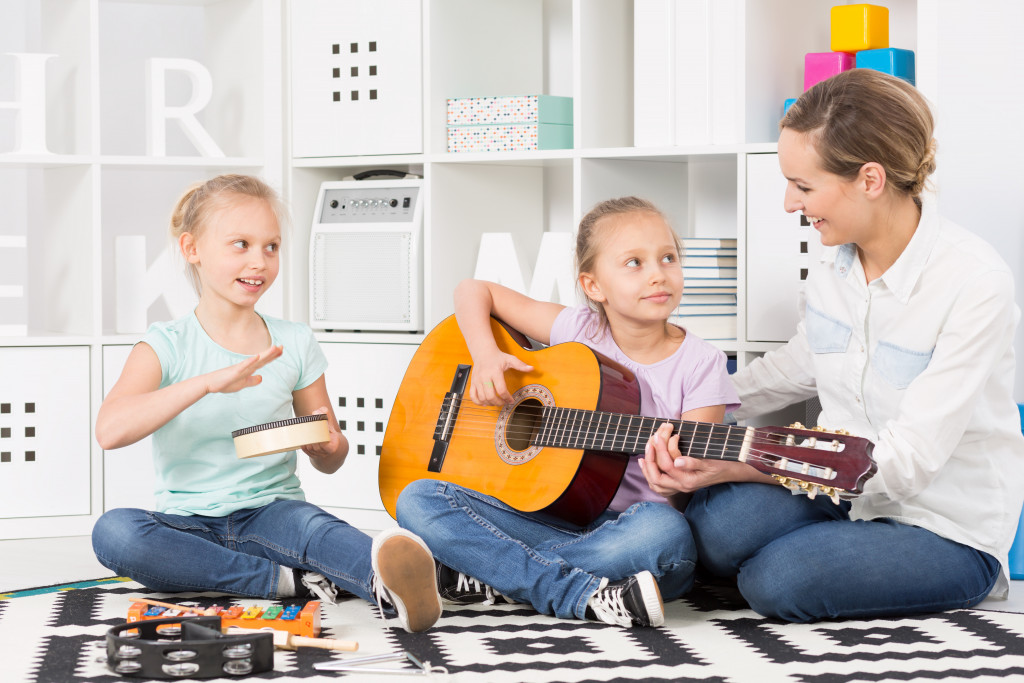• Music is an important part of any child’s development and can help boost self-esteem and teach discipline.
• Parents should find an instrument that fits their child’s interests and abilities, such as a guitar, a violin, or drums.
• Creating a space at home dedicated to musical practice is essential and should be free from distractions like TVs and video games.
• Encouraging your child’s passion for music is an excellent way to foster creativity and help them build skills.
Music is an important part of any child’s development. It encourages creativity and expression, boosts self-esteem, and teaches discipline. If you are the parent of a young musician or want to help your child develop their passion for music, there are a few things you can do to provide encouragement and support.
Benefits of Music to Children
Music can positively impact various aspects of your child’s development. It is an excellent way to learn about discipline, practice patience, and gain confidence. Music also enhances their emotional intelligence and helps them recognize the emotions in others. In addition, research has suggested that music can enhance mental abilities such as language and math skills. This is because music requires the use of both sides of the brain.
So if you notice that your child has an inclination to music, here are a few ways you can help them develop their passion:
Finding Instruments that Fit Your Child’s Interests
To foster enthusiasm for learning an instrument, it is important to find one that fits your child’s interests and abilities. While traditional instruments like the piano remain popular among parents, other options may be more suitable for your child’s interests and skill level. Here are your options:
- Guitar: If your child is interested in playing folk, rock, blues, or jazz music, the guitar is a great option. Its strings can be easily manipulated to create different sounds, and its portability makes it an ideal instrument for young musicians.
- Violin: The violin is perfect for classical music enthusiasts. It has a distinct sound, and its small size makes it ideal for younger children.
- Drums: Drums are a great way to introduce kids to rhythm and beats. They come in different sizes, so you can find one that fits your child’s interests and skill level.
Additionally, if you notice that they enjoy singing or are interested in electronic music production, consider investing in an electronic keyboard instead of a traditional acoustic piano because they offer more flexibility and sound options.

Creating Space at Home for Musical Practice
Creating an area at home dedicated specifically to musical practice is also essential in helping your child stay motivated and engaged with their instrument. This space should be free from distractions like TVs or video games so that they can focus on developing their skills without interference from outside sources. Here’s how you can start:
Choose the Right Location
You should choose an area in your home close to other family members but far enough away from distractions. Dedicating a separate room for musical practice is ideal. However, it may not be possible in smaller homes. If you have a small house, create a corner in the living room or kitchen where your child can practice without interruption.
Provide the Necessary Supplies
Once you have chosen the right area, make sure it is stocked with all the necessary supplies for musical practice, such as music stands, chairs, tuners, and metronomes. Additionally, to encourage your child’s creativity, consider purchasing recording equipment to experiment with.
Purchase or Rent a Quality Instrument
Investing in a good-quality instrument is important, as it will give your child the best chance of developing their skills. You can buy a new instrument, but if you’re on a budget, many stores offer rentals and used instruments in good condition.
Finding Resources That Make Learning Fun
Ensuring your child is exploring resources that make learning fun and engaging is important. This way, they will stay motivated and interested in the instrument. To do this, you can look for the following options:
Take Music Lessons

Enrolling your child in music lessons is the best way to get started. A good teacher can guide your child through the basics of playing an instrument and help them stay on track with their practice. Enrolling in Kindermusik classes is a great way to introduce your child to music in a fun and interactive environment. These classes offer instruction and support for various instruments and age-appropriate activities to help your child develop their needed skills.
Explore Online Resources
Your child can use interactive and educational online resources to learn more about music. They offer tutorials, exercises, games, and other activities that help keep learning fun and engaging. These resources can also be used as a supplement to their private music lessons, helping them master their instrument even faster.
Encouraging your child’s passion for music is an excellent way to foster creativity and help them build skills that will benefit them in the future. With these tips, you can provide a supportive environment for your young musician to flourish.


